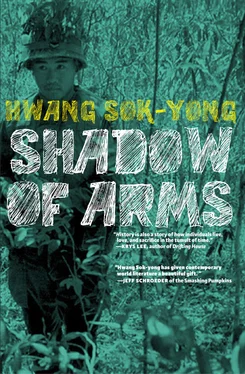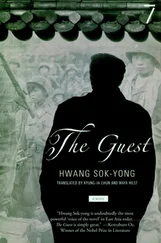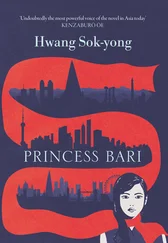“Half the profits are yours. And we divide up the profits at the close of each deal. What do you say?”
“No argument.”
“I’ve already clarified the two necessary and sufficient reasons for you and I to cooperate, haven’t I?”
“Yes. If I’m not mistaken, the first was, when you and I cooperate, each with detailed information on the dealings of the provincial office, I’ll have a good grip on my superiors’ vitals. The second was that I, as Major Pham’s man, and you as his brother, are in identical key positions in Da Nang and so are natural allies. As for the third, you said you’d tell me only after I agreed to be your partner. So, tell me now, what is it?”
“I have connections. . with the NLF.” Pham Minh spoke in a barely audible whisper.
Kiem calmly asked, “Have you joined the NLF?”
“No… I’m a deserter from that side. And as for this side, I bought my way out of duty. In a sense, I’ve been separated from both the Saigon and Hanoi sides. But I still have connections with the NLF in Da Nang. So, you can safely turn your goods into cash through this partner. That’s the third reason that makes our partnership most desirable.”
“I see that now.”
The waiter came up and said gravely, “Here’s the check. Sorry, but it’s closing time.”
“Ah, we should leave.”
Pham Minh paid the bill and said to the waiter, “Give us five more minutes, will you?”
“As you wish, sir.”
Minh took a sealed envelope out of his back pocket and placed it on the table.
“Here’s a hundred thousand piasters,” Minh said, pushing the envelope toward Lieutenant Kiem. “You can consider it as an advance against profits from our coming deals. I just wanted you to have it as a token to seal our partnership.”
“Well, it makes me a little uncomfortable—”
Pham Minh didn’t let Kiem finish. “If you insist… we can set the prices for various items and commence our deals from next week.”
“On what basis will we decide the prices?”
“Naturally, we’ll observe the going rates in Saigon.”
“Good.”
Minh did not remove his eyes from Kiem as the latter picked up the envelope and stuck it in the upper pocket of his uniform, then got up from his seat. When they parted at the front door of Guangzhou Restaurant, Pham Minh held out his hand and said, “I’m counting on you.”
“Glad to have met you.”
The lieutenant drove away in a Jeep with official license plates. Minh stood for a while in front of the Chinese restaurant. Nguyen Thach approached him from behind.
“Looks like you worked it out. Well done.”
“Can we trust him?”
“He took the money, didn’t he?”
“Yes. He was quite calm about it.”
“A hundred thousand is his salary for a whole year, even if such a sum means nothing to the American soldiers.”
“Mentioning the NLF was the moment of truth,” Pham Minh said.
“He’s already cast his lot. Now, let’s get back to Le Loi Boulevard”
Starting the engine, Thach added, “If Kiem had refused the money, I would’ve had no choice but to shoot him.”
On the outskirts of the city, with the fall of night, as always, came the sound of gunfire and heavy artillery. Formations of helicopters flitted through the sky. Along Doc Lap Boulevard, Puohung Street, and White Ivory Street, lined with government offices and large buildings, there were a few vehicles but no trace of pedestrians. Even so, the small tearooms and bars exclusively for the local Vietnamese population were sometimes packed until late with young men and women who had nowhere else to go. For a few months after the Tet Offensive, there had been a lull in attacks in the city, apart from the usual assaults mounted by the guerrillas native to the environs.
The American side could not mount any major offensives, either. The general impression that the war was under the control of the US military and the ARVN had been completely shattered since the previous spring. Now, the US presidential election was set for November, and Johnson had just announced that he would not be seeking re-election. It seemed that for the time being the US forces preferred to maintain the status quo and preferred not to mount any vigorous new initiatives.
The entertainment districts of Da Nang began to blossom like the old days. The newspapers even began to talk optimistically about the biggest boom since the beginning of the war.
Lei was sitting at Café Hoitim. The entire place — interior, curtains, and tablecloths — was done up in a violet color scheme, perhaps reflecting the café’s name. It was a drinking establishment where all refreshments, from American canned beer to Vietnamese flower wine, were sold by the glass. Coffee, tea, and lemonade were also available, of course. The patrons, high school seniors, students from the technical college, young teachers, office workers, and a smattering of soldiers, were thronging in small scattered groups, talking loudly and laughing. The unwritten code of the place was that anyone who brought up the subject of the war or politics could, at the request of any other customer, be asked to make a graceful exit.
Sitting across from Lei were Chan Te Shoan and Tran Van Phuoc. Lei and Phuoc were drinking coffee, but Shoan was already having her third glass of flower wine over ice.
“Shoan, what if you get drunk?” Lei asked, concerned.
“She’ll be all right,” Phuoc said. “I might have some myself. If it gets too late, you two can sleep at my house. It’s only a block away.”
“No, I couldn’t. My family would worry.”
“I’ll call and explain it to them for you later.”
Lei and Phuoc ceased their exchange when they noticed that Shoan was quietly crying, her head leaning against the wall.
“Shoan. .”
“What’s wrong, Shoan?”
Shoan took a handkerchief from her bag and quickly wiped her cheeks. “Why ask what you already know?”
Phuoc whispered in Lei’s ear, “We’re seniors. After graduation exams, we’ll be through with school. Those qualified for college will go to Hue or Saigon, but I wonder how many of us will go? Technical colleges and commercial schools are only for boys. In Da Nang most families arrange for daughters to be engaged when they are seniors, and marriage comes as soon as you graduate.”
Lei asked Shoan, “Sister, is your family pressuring you to get engaged?”
“No, not really,” Shoan replied, smiling bitterly.
“Yes, really,” Phuoc said. “I’m so sick and tired of it. I’ve already had to see men found by a matchmaker. I was embarrassed to death. I’m pestering my father to let me slip away to Hue.”
“Is Minh at home?” Shoan asked Lei.
She nodded feebly. “Yes, but he’s changed.”
Phuoc snorted. “Phew, that coward!”
“Are you done?” Outraged, Lei pushed her chair back and got up to leave. Phuoc grabbed her hand.
“Dear, dear, sit down please. My mistake. I’m sorry.”
“Sit down, Lei.”
At Shoan’s entreaty Lei sat back down, her lips in a pout.
“I apologize,” Phuoc went on. “But remember how proud you were when you told us that Mr. Pham Minh had gone off into the jungle? I mean, our seniors in high school. . have you thought about them? Boys who left to fight for the Liberation Front, and those girls… I was only saying what I honestly felt.”
“I understand how you feel, Sister, I do.” Lei suppressed an urge to burst into tears and instead blew her nose fiercely.
“Stop it, you two. Let’s go to my house. I’ll call your families.”
Phuoc urged Lei and Shoan to get moving. The three of them left the cafe and walked toward the beach. From a club somewhere they could hear the roar of American soldiers yelling and singing. Phuoc led the way, followed by Lei and Shoan, whose gait was a bit unsteady from the drinks.
Читать дальше












